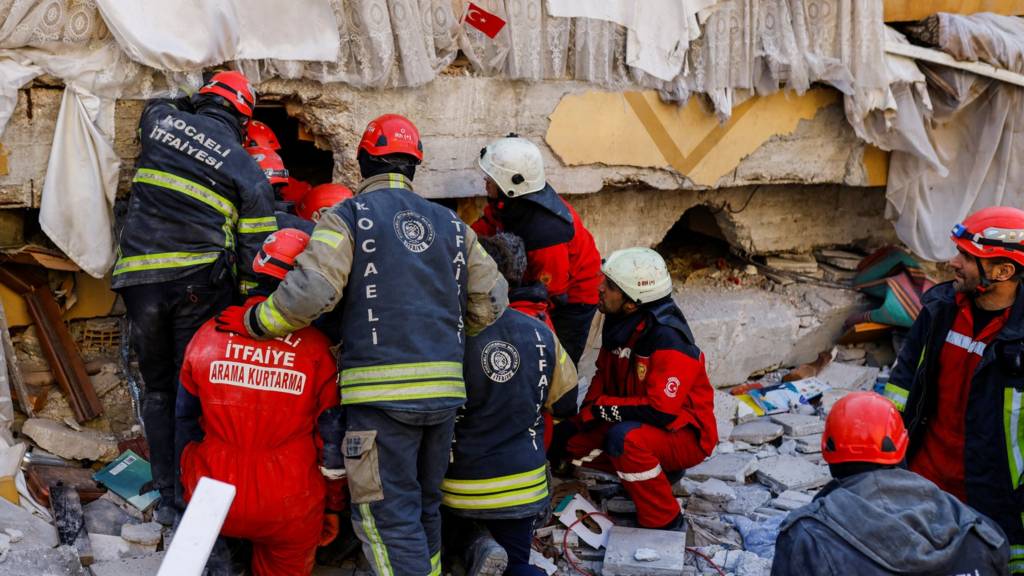
Survivors found five days after quake as death toll passes 25,000
Updates from BBC correspondents on the ground: Assaf Abboud in Aleppo, Nick Beake in Gaziantep, Quentin Sommerville in Syria, Lyse Doucet in Osmaniye, Tom Bateman in Adana, and Alice Cuddy in Iskenderun
Related Video and Audio
RTL
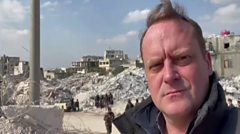
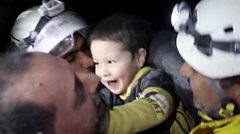
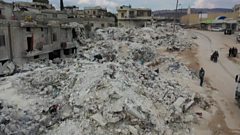
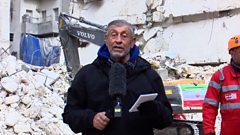
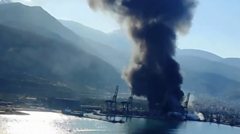
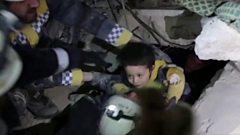

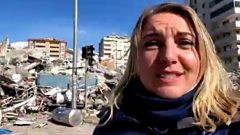
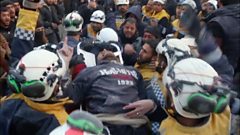
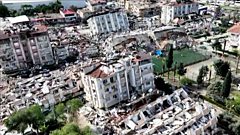


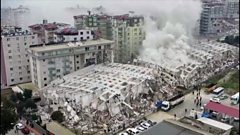

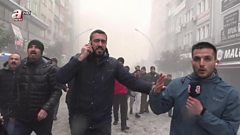

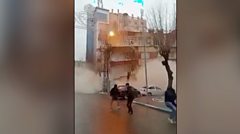
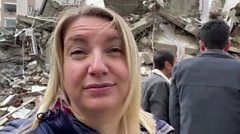

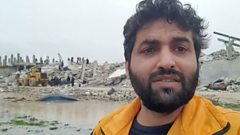
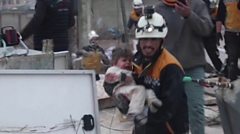

Live Reporting
Edited by Jeremy Gahagan and Marita Moloney
All times stated are UK
Get involved
We are losing the race against time now - aid worker
Aid worker Salah Abouglasem of Islamic Relief has been helping in the rescue efforts in Turkey since Monday evening.
Currently in the city of Gaziantep, in southern Turkey, he says that while rescuers are still working and "still believe that miracles are still happening... at the same time we're really losing that race against time now".
He says now that 72 hours have passed - the time in which people are likely to be saved - the extremely cold conditions are decreasing the likelihood that more people will survive.
"Our concern as an aid organisation is the sanitation needs now, the illnesses that people are going to develop, the absence of clean water, we’re appealing to people to continue with their efforts to reach here," he says.
He says his colleagues in Syria say the situation there is "even more difficult" because of the absence of a coordinated effort.
UK charities launch disaster appeal
An appeal is being launched by the Disasters Emergency Committee (DEC) to help the many thousands of people affected by the earthquake.
The committee is a collective of 15 UK charities - including Oxfam, Save the Children UK and the British Red Cross - which work together to raise money in response to major crises overseas.
The funds raised will go towards medical aid, shelter, food and clean water, as well as blankets, warm clothes and heaters - as homeless survivors and the injured battle freezing temperatures.
The UK government will match the first £2m ($2.4m) of donations from the public.
DEC chief executive Saleh Saeed described the scenes in Turkey and Syria as "heartbreaking", with thousands "losing loved ones, suddenly, in the most shocking of ways".
You can read the full story here and find details of the appeal on the DEC website.
Challenge of 'keeping survivors alive' comes next, says WHO
Humanitarian organisations have the challenge of making sure people who survived the earthquake "continue to survive", says the World Heath Organization.
Speaking at a press conference in Geneva earlier today, Robert Holden - the WHO's incident response manager - said there were thousands of people now surviving "out in the open, in worsening and horrific conditions", with disrupted access to water, fuel, electricity and communications.
"We are in real danger of seeing a secondary disaster which may cause harm to more people than the initial disaster if we don't move with the same pace and intensity as we are doing on the search and rescue," he said.
"This is no easy task... The scale of the operation is massive."
How do rescuers search for people trapped under rubble?
As has been seen over the past days, rescuing people trapped under masonry following an earthquake can be a lengthy and difficult task.
When rescuers first arrive at the scene, they have to assess which collapsed buildings are most likely to contain survivors.
They do this by looking for "voids" - spaces under large concrete beams or stairwells where people might be found.
The possibility a building could collapse further also needs to be taken into consideration, as do other dangers such as gas leaks, flooding and hazardous materials such as asbestos in roofs.
Buildings that have completely collapsed are usually the last to be searched, because the likelihood of finding survivors is very slim.
While rescuers attempt to reach survivors, support workers watch for building movements and listen out for human sounds.
Heavy machinery, like diggers and hydraulic jacks, can also be used to move larger bits of wreckage, while specialist video and sound equipment can aid the search for those trapped beneath.
Silence on the site is needed while a member of the rescue team bangs three times and hopes to hear a response.
Thermal imaging equipment, carbon dioxide detectors and specially trained sniffer dogs are also among the tools used to help detect human life.
And - where the murmur of life is discerned - sometimes, it's a question of digging with your bare hands.
Read the full story here.
'Window is closing' to get basic aid to survivors - Save the Children
It is three days since the earthquake struck and the charity Save the Children says the window to get shelter, medical supplies, water and food to the worst affected areas is rapidly closing.
The earthquakes are estimated to have impacted about 23 million people, among them many children - and survivors are struggling to cope in freezing conditions.
Those affected urgently need basic humanitarian aid such as blankets and clean water. Sanitation in temporary shelters is also a growing priority, states the charity.
“There are limited hygiene facilities and availability of food sources," says Berna Koroglu, Save the Children's Emergency Response Team Coordinator, who is currently in Hatay, Turkey.
"We need support, and especially psychological first aid support for children, who have watched their homes and schools collapse.
"The international community needs to do all it can to support local humanitarian workers.”
Hello and welcome to our live coverage
Hello and welcome to our live coverage as rescuers continue to look for survivors of Monday’s quake in southern Turkey and northern Syria.
Nearly 16,000 people are confirmed to have died, with the death toll set to rise further as rescue and recovery efforts continue for a fourth day.
The chances of finding survivors trapped beneath rubble and debris are becoming slimmer, with freezing temperatures a major factor affecting conditions.
There has been anger in Turkey over claims that emergency services responded too slowly to the incident, with some people waiting days for help to reach them.
Turkey’s President Recep Tayyip Erdogan yesterday accepted the government had encountered some problems, but said the situation was now “under control”.
In Syria, relief efforts have been complicated by years of conflict that has destroyed the nation's infrastructure.
Stay with us for live updates.